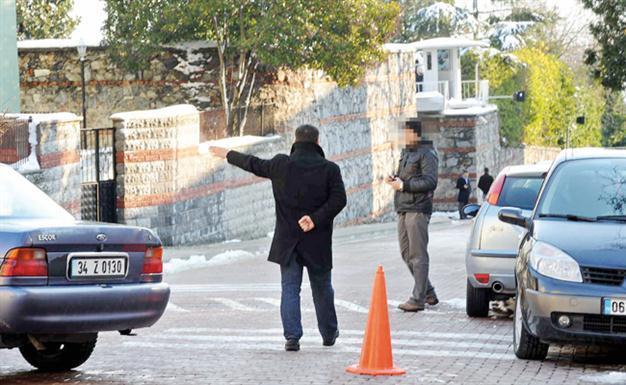Intelligence crackdown
ANKARA - Hürriyet Daily News

Plain clothes police officers surround the Turkish intelligence organization’s headquarters in Istanbul’s Beşiktaş district as crisis over secret service deepens. DHA photo
Turkey’s government submitted a draft law to Parliament late Feb. 10 to provide spy officials with more immunities from prosecution just hours after a specially authorized prosecutor ordered the detention of four intelligence officers.Police, however, reportedly detained two of the wanted MİT officials in Istanbul the same day, indicating that the judiciary and the police will not step back in the ongoing tension. The names of the detained were reportedly Y. Yıldırım and H. Kuzuoğlu. Former MİT chief Emre Taner and former senior MİT official Afet Güneş were not in custody yet as the Hürriyet Daily News went to print.
Meanwhile, five people, one of them allegedly a MİT official, were taken into custody in the southern province of Adana on allegations that they handed over two Syrian dissidents to Damascus.
According to President Abdullah Gül, the whole episode is “unfortunate and sorrowful” for the nation.
The proposed amendment, which would amend Article 26 of the MİT Act, would provide the shield of the prime minister’s permission not only to MİT employees but also to those whom the prime minister assigns with a “special task” and protect them from accusations cited in Article 250 of the Penal Code. The purpose of the clause is to protect current MİT chief Hakan Fidan from being prosecuted as he was not a MİT member in early 2010 when he was the member of a team negotiating with the outlawed Kurdistan Workers’ Party (PKK) in Oslo.
The draft, expected to be debated at Parliament’s Justice Commission on Feb. 14, explicitly states that the prime minister’s permission would be required to investigate MİT employees and those assigned a special task by the prime minister for any “alleged crimes that arise from the nature of their duties or that they commit while carrying out their duties, or for alleged crimes that fall under the jurisdiction of the special-authority courts.”
Justice Minister Sadullah Ergin informed President Abdullah Gül about the content of the amendment late Feb. 10 just before the draft law was submitted to the Parliament.
Describing the situation as “unfortunate and sorrowful” for Turkey, Gül called on all parties to control their tempers and to place Turkey’s security in front of everything, especially at a moment its neighborhood is passing through a historical moment.
“Particular attention should be paid while making accusations against institutions because of doing their jobs given by the law,” he said in overt support to the MİT members.
Hakan Fidan called to testify
A day after MİT refused to allow the men to give testimony on the grounds that the prime minister’s permission was not sought, specially authorized prosecutor Sadettin Sarıkaya ordered the detentions of former MİT chief Emre Taner and former senior MİT official Afet Güneş and two other MİT members. The four were ordered to “be detained on sight” and brought to Istanbul by police. In addition, Sarıkaya issued a formal request to the Ankara prosecutor to receive the testimony of Fidan.
There was no comment from MİT on the development.
According to media reports, the prosecutor’s call for testimony came after the police discovered alleged the misdoings of some MİT members while investigating the Kurdistan Communities Union (KCK), the urban wing of the outlawed Kurdistan Workers’ Party (PKK).
MİT member in custody in Adana
Another source of tension between MİT and the judiciary and police came from Adana as one alleged intelligence officer was arrested as part of an investigation launched by the Adana chief prosecutor.
In its statement, the chief prosecutor’s office said the investigation was about the alleged handing over of two Syrians – Lt. Col. Hussein al-Harmoush and Mustafa Kassum – to Syrian government forces. The two dissidents were “forcefully taken from their shelters” in the southern province of Hatay and handed over to Syrian forces, the statement said.
Other MİT members have also been “invited to testify” as suspects, Anatolia news agency reported. However, sources said the arrested person deemed to be a MİT member was expelled from the intelligence service a few months ago due to his inappropriate behavior and had had no connection with the service since then.
Al-Harmoush had defected in June to Turkey, but in September, he was arrested in Syria. Speaking to the Hürriyet Daily News on condition of anonymity on Feb. 10, one Syrian dissident said al-Harmoush was “tricked by the Syrian intelligence” who was able to penetrate the refugee camps in Hatay into returning to Syria. The dissident rejected claims that Turkish intelligence played a role in the incident.
PM silent, AKP critical
In the third day of the MİT crisis, Prime Minister Recep Tayyip Erdoğan remained silent but members of the government and his party continued to criticize the judiciary’s move.
“Fidan is the civil servant of our prime minister. We believe necessary procedures should have been applied,” Transportation Minister Binali Yılıdrım told reporters. “The Penal Code has been entirely amended but there could be surprises in the implementation.”
Likewise Defense Ministe İsmet Yılmaz also said MİT was serving the interests of the country and called on everyone to lend support to it.
For Ömer Çelik, deputy leader of the Justice and Development Party (AKP), the purpose of the legal move is to limit the effectiveness of the MİT. “If you accuse the MİT over its duty, then it means you want MİT to not do its job. Hakan Fidan is a patriotic, talented and high-skilled civil servant with high spirits for democracy,” Çelik said.
















